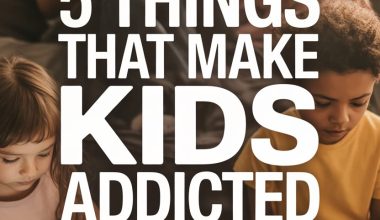Ever feel like your child is more like a mini tech CEO than a kid? You’re not imagining things.
Parenting Gen Alpha – those born from about 2010 onwards – feels like playing a video game where the rules change mid-level, the controller’s missing, and someone keeps yelling “new update available!” from the other room.
There’s a reason so many parents are clutching their oat lattes for dear life.
Gen Alpha kids simply aren’t the same breed as previous generations, and the parenting playbook has been set on fire (possibly by a 9-year-old with a magnifying glass and a YouTube tutorial).
Screens Are Their Native Habitat
These kids have never known a world without Instagram reels, smart speakers, or the ability to ask Alexa to rap.
While older generations had to wait for dial-up internet (if they had it at all), Gen Alpha expects everything immediately and intuitively.
Try telling a seven-year-old to “just look it up in the encyclopedia.” There’s a real risk they’ll ask if that’s a Pokémon character.
All this tech immersion has rewired how they think, socialize, and learn.
According to this Common Sense Media report on children’s media use, kids under 8 now average over two hours a day on screens – and that’s before their schoolwork went digital.
The result? Patience, delayed gratification, and boredom are all on the endangered list.
Information Overload and Zero Filters
Childhood used to be a bit like living at the end of a cul-de-sac: what you saw depended on your neighbours, your parents, maybe what Aunty Sheila said at the last barbecue.
Now, Gen Alpha has the world in their pocket (and sometimes in their ear, on their wrist, or projected on the living room wall).
The internet doesn’t come with a bouncer at the door. Kids are exposed to news, trends, and opinions before most adults have even put the kettle on.
From world crises to viral dance crazes, they soak it all in—with no built-in filter for what’s true, scary, or just plain daft.
This means parents have to play detective and fact-checker, all while trying not to sound like the fun police. Exhausting? You bet.
Social Pressures Start Younger and Hit Harder
Remember when “peer pressure” meant someone dared you to swap sandwiches at lunch? Gen Alpha’s social life is 24/7, thanks to messaging apps and social media.
The playground now extends to WhatsApp groups, private servers, and, for the brave, TikTok.
Bullying and cliques have gone digital, making it harder for parents to spot the warning signs. Kids can’t just leave their troubles at the school gate—they follow them home, buzzing in their pockets.
A study from the University of Manchester found that increased social media use is linked to anxiety and depression in children, often starting as young as 9 or 10.
Parents are left trying to police a virtual world where the doors never shut.
They’re Unimpressed by Authority
“Because I said so” is about as effective as shouting into a void these days.
Gen Alpha has grown up watching adults debate on social media, fact-checking teachers in real-time, and Googling any statement that sounds the slightest bit off.
Questioning the rules isn’t just normal; it’s encouraged by everything around them. They want to know why, and “I don’t have to explain myself” is a surefire way to inspire an eye roll or TED Talk-length rebuttal.
On the upside, they’re critical thinkers. On the downside, you may find yourself defending the logic of bedtime to a six-year-old with more debate skills than a law student.
School Has Changed (and So Have the Expectations)
Gone are the days when all you needed was a pencil case and a willingness to sit still. Gen Alpha’s school lives are a digital maze of EdTech platforms, multimedia projects, and online assignments.
Many parents feel outpaced, not just by the jargon (“blended learning,” “flipped classrooms,” “growth mindset”) but by the technology itself.
Trying to help with a “simple” maths sum can end with a parent googling what a “maths manipulative” even is.
Even the social side is different. Friendships are formed through gaming as much as in real life. If you can’t tell the difference between Minecraft and Roblox, it’s easy to feel left out of your own child’s world.
The Pandemic Factor
Gen Alpha’s formative years have been shaped by lockdowns, remote learning, and a general sense that the world can turn upside down overnight.
Many spent crucial developmental stages indoors, glued to screens for both “school” and “fun.”
This has left a mark. According to a report from UNICEF, many children now struggle with social skills, resilience, and mental health.
Parents find themselves rebuilding basics—like play dates and classroom confidence—all while working, cleaning, and trying to remember what day it is.
Their Activism Is Relentless
If you thought you could sneak a plastic straw into the bin without comment, think again. Gen Alpha kids are hyper-aware of social causes, from climate action to equality.
This passion is impressive—until you’re scolded by a nine-year-old for buying the wrong kind of eggs.
Parents are now expected to be up-to-date on every social issue, ready with the right language, and always able to explain why the recycling bin is full (again).
Discussions that used to wait until the teen years are now happening in primary school. The conversations are important, but they can leave parents feeling like they’re always one step behind.
Parenting Advice Is Infinite and Contradictory
A quick search for “screen time tips” can land you in a rabbit hole where every expert disagrees, and every parent swears their way is the only way.
Gen Alpha’s parents are bombarded with advice, from gentle parenting podcasts to old-school discipline books.
It’s hard to know whose voice to trust—or which rules even apply when your child is learning Mandarin on an iPad while negotiating screen time boundaries.
This avalanche of information leads to decision fatigue. Sometimes, the only thing parents are sure about is that they’re not sure about anything.
They Expect Personalisation in Everything
Gen Alpha is used to playlists, custom avatars, and on-demand everything. This mentality extends to schoolwork, hobbies, chores, and even dinner.
If your child asks for a “taco bar” at home, it’s not because they’re cheeky—it’s simply what’s normal for them.
Expectations of individuality are sky-high.
Every activity should be customizable, every interest validated. Parents are often left scrambling to keep up, trying to offer options while still maintaining a semblance of routine.
Old-school, one-size-fits-all parenting? Dead on arrival.
Practical Survival Strategies for Parents
All of this might sound like a recipe for hiding under the duvet until the kids move out. But there are ways to stay sane and even enjoy the ride.
Create digital boundaries together
Instead of a blanket ban, work with your child to set limits on screen time. Talk about why certain apps are off-limits, and involve them in the decision-making.
Try tech tools like Google Family Link or Apple Screen Time for a little help from the robots.
Fact-check together
When your child brings up something wild they saw online (“Mum, did you know bananas are radioactive?”), turn it into a group investigation. This teaches critical thinking and shows you’re on their team, not just the “no” committee.
Prioritise real-life connection
Make space for family rituals—games night, Sunday roast, or whatever gets everyone chatting face-to-face (even if it’s over pizza and not kale smoothies).
Model curiosity
Staying curious about their interests (even if you’d rather clean the gutters than learn about Roblox) shows respect and keeps communication open.
Don’t panic about perfection
No one gets it right all the time. Give yourself permission to be “good enough.” Sometimes, that means serving chicken nuggets for the third time this week. No judgment here.
Find your village
Seek out other parents—online or off—who get it. Swapping stories and advice helps you feel less alone in the chaos.
Why It’s Worth It
Gen Alpha may be harder to parent, but they’re also creative, open-minded, and resilient in ways that surprise even the experts.
They’ll keep you on your toes, challenge your assumptions, and probably teach you a thing or two about coding, social justice, or the art of the perfect meme.
Yes, the game has changed. But if anyone’s up for the challenge, it’s you—the parent who can juggle a Zoom call, a snack request, and a moral debate about single-use plastics, all before breakfast.
Take heart: you’re raising the generation that will invent the next big thing, challenge the status quo, and possibly fix whatever we’ve bungled along the way.
As exhausting as it can be, that’s something to be proud of—oat latte in hand.
Now, where did you leave your phone again?





